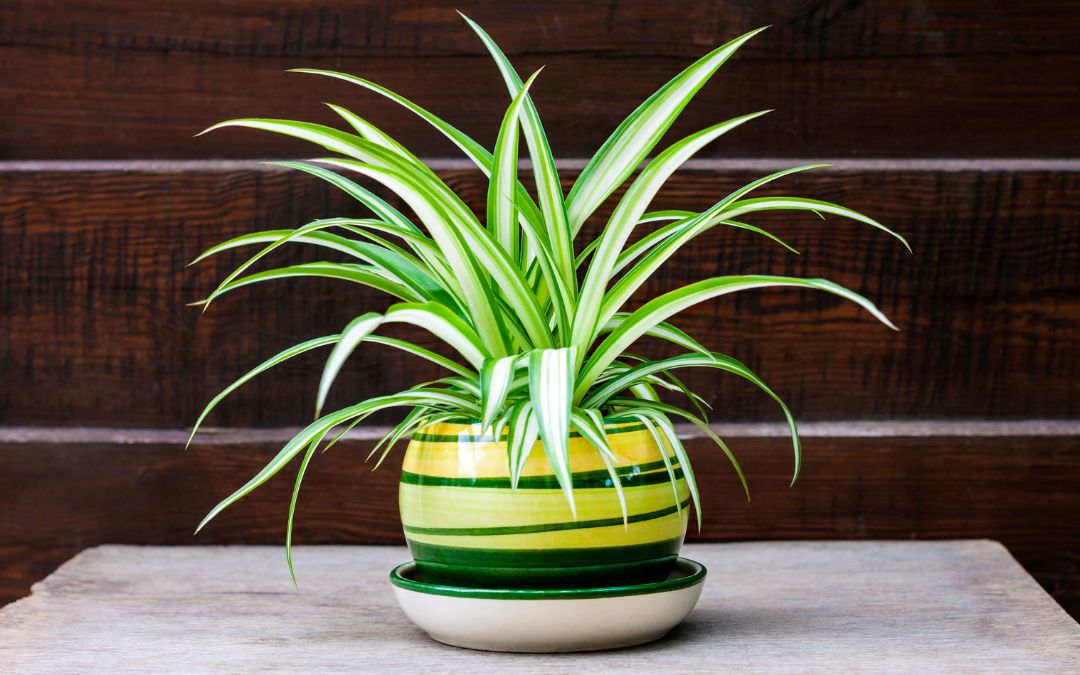Plant Power
Welcome to the world of house plants, where beauty meets wellness! If you’ve ever wondered how to elevate your home decor while simultaneously boosting your health, you’re in for a green treat. House plants aren’t just a trendy addition to your interior; they’re a breath of fresh air, quite literally! In this blog post, we’ll jump into why incorporating these lush companions into your living space is not only visually pleasing but also a healthy boost for your physical and psychological well-being. We’ve narrowed down the top 5 best house plants to turn your home into a flourishing oasis of style and vitality.
Spider Plant
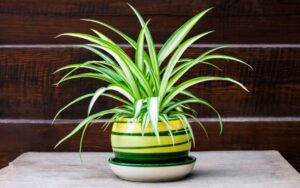
Don’t let the name scare you. These lush beauties are nothing to be frightened of! Spider plants are known for their long, arching green leaves adorned with creamy-white stripes that make them look “spider-like.” Aside from their visual appeal (especially in a hanging basket!), they offer many health benefits. They can be your personal humidifier, adding humidity to the air, which can significantly help during cold and flu season. They have air-purifying qualities and efficiently filter out toxins and pollutants from the air, contributing to improved indoor air quality and reducing respiratory problems and allergies. Having a spider plant around will help promote cleaner, more breathable air.
Care– These low-maintenance house plants thrive in moderate to bright indirect light. Their simple care routine of regular, even watering and occasional fertilization makes them perfect for novice gardeners.
Aloe Vera Plant
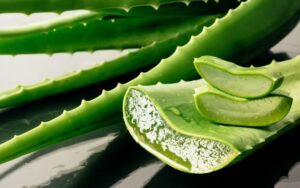
There’s a reason why aloe vera is known in the medicinal world for its healing properties. These succulent beauties have thick, fleshy leaves filled with a soothing gel-like substance. The gel inside their leaves has potent anti-inflammatory and healing properties, which can be applied topically to soothe burns, wounds, bug bites, and skin irritations such as acne and psoriasis. It also contains beta-carotene, an antioxidant known to help in eye health. When consumed as a juice or supplement, aloe vera can aid digestion and heartburn, alleviate constipation, and even support oral health by reducing gum inflammation. As if that weren’t enough, this house plant also has air-purifying qualities, improving indoor air quality by removing airborne pollutants.
Care– Aloe vera plants are a breeze to care for and are adaptable to various climates. They require minimum watering and are best left indoors with indirect sunlight. They are an easy and low-maintenance house plant to keep around.
English Ivy Plant
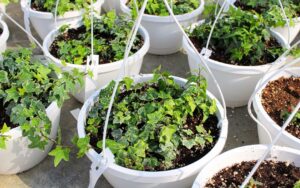
Allergy and asthma sufferers can rejoice because this indoor plant has the potential to give them much relief! That’s right! That charming evergreen plant you’ve probably seen climbing up your trees, walls, and around fences might just be your next house plant. Just the presence of an English ivy plant indoors can purify up to 90 percent of the airborne mold that can cause allergies. English ivy has been shown to thin mucus and is particularly helpful during cold and flu season. It has been shown to aid in upper respiratory infections and colds. When turned into an extract, English ivy has proven to impact children’s coughs significantly. Many of these benefits stem from the antioxidant and anti-inflammatory properties found in the leaves of the English Ivy plant. Additionally, people who have asthma have reported improved breathing, especially at night, leading to a more restful sleep.
Care– Caring for English ivy indoors is relatively simple, as it thrives when the soil is primarily dry, so minimal watering is necessary. It also flourishes in direct sunlight, so a sunny window is the perfect spot to keep your house plant.
Jasmine Plant
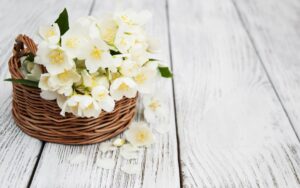
You’ve probably heard of jasmine used in fragrances and perfumes or adorned in vases on tabletops. Still, jasmine has so many uses for your health, too. Not only are the white star-shaped blossoms a visual and fragrant delight, but they are also a balm for the soul and make a wonderful indoor house plant. The mental health benefits of jasmine plants have been well-documented for centuries and can often be found in teas. Its scent has a calming and mood-enhancing effect, reducing stress and anxiety levels. The aroma can promote relaxation, improve sleep quality, help alleviate symptoms of depression, and even improve immunity. The jasmine plant is rich in antioxidants and polyphenols, which improve brain activity and secrete mood-enhancing neurotransmitters like serotonin and dopamine. It enhances concentration, focus, calmness, and cognitive function. The benefits of jasmine seem to be endless, so keep a few of these potted beauties in your living space and begin to uplift your spirits and enhance your overall mental well-being.
Care– Caring for jasmine plants can be therapeutic, as they thrive in well-draining soil and bright, indirect sunlight and do well beside a fence or wall. In warmer climates, they can even be grown outdoors.
Lavender Plant
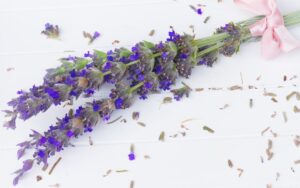
There’s no mistake when you spot those bunches of purple leafy herbs. Their beauty makes lavender plants worth growing, but their mental health benefits may outweigh their aesthetic appeal. The light, soothing scent of lavender has been shown to have profound medicinal and therapeutic effects, even since ancient times. Inhaling its fragrance can reduce anxiety, stress, and restlessness and even improve mood. Lavender is often used in aromatherapy to induce relaxation and promote restful sleep, making it a natural remedy for insomnia and mood disorders. Its calming properties extend to reducing symptoms of depression and enhancing overall emotional balance. So, spruce up your home and well-being by adding a few lavender house plants.
Care– These hardy perennials thrive in full sun and do well growing in containers. They don’t require much watering, so they are easy to maintain. Cultivating lavender in your home adds beauty and provides a fragrant and therapeutic presence that contributes to better psychological health.
Final Thoughts
When it comes to your physical and psychological health, nothing is more important. Your wellness is our top priority, and we hope it’s yours too. If you want true health care, not simply sick care, consider a Knew Health Membership today- a monthly membership offering true preventative care services while providing a safety net for medical expenses through our medical cost-sharing community.
If you’re not a Knew Health member yet, take the first step towards prioritizing your health by calling us at 855-542-0050 or scheduling an appointment with our Care Team.
As we wrap up our green journey through the perks of house plants, remember that these leafy companions are more than just trendy decor—they’re your personal wellness warriors! From purifying the air you breathe to conquering your allergies to brightening your mood on a gloomy day, house plants can bring good vibes into your life. So, whether you’re a seasoned plant parent or just starting to grow your indoor jungle, keep nurturing those green friends and watch your well-being flourish with them. Here’s to a happier, healthier, and greener you! Happy planting!
Sources
Basu, Soumita . “Jasmine: 5 Astonishing Benefits Of Adding This Incredible Flower To Your Diet.” Netmeds.Com, 14 Mar. 2021, www.netmeds.com/health-library/post/jasmine-5-astonishing-benefits-of-adding-this-incredible-flower-to-your-diet.
Boeckmann, Catherine. “How to Grow and Care for Spider Plants.” Almanac, 11 Sept. 2023, www.almanac.com/plant/spider-plants.
“Best Indoor Plants | 15 Plants That Are Good for Your Health.” Bright Side, 1 Oct. 2022, www.brightside.me/articles/15-houseplants-that-are-good-for-your-health-795541/.
Goldman, Rena. “Everything You Want to Know About English Ivy.” Healthline, 3 Nov. 2016, www.healthline.com/health/5-fast-facts-english-ivy#benefits.
Griffin, R. Morgan. “Aloe Vera.” WebMD, 5 Jan. 2023, www.webmd.com/diet/supplement-guide-aloe-vera.
Higuera, Valencia. “What Are the Possible Benefits of Lavender? The Must-Know Facts About the Therapeutic Plant.” Everyday Health, 29 Oct. 2022, www.everydayhealth.com/diet/what-are-possible-benefits-lavender-must-know-facts-about-therapeutic-plant/.
Disclaimer: This information is being provided to you for educational and informational purposes only. It is being provided to educate you about how to take care of your body and as a self-help tool for your own use so that you can reach your own health goals. It is not intended to treat or cure any specific illness and is not to replace the guidance provided by your own medical practitioner. This information is to be used at your own risk based on your own judgment. If you suspect you have a medical problem, we urge you to take appropriate action by seeking medical attention.
